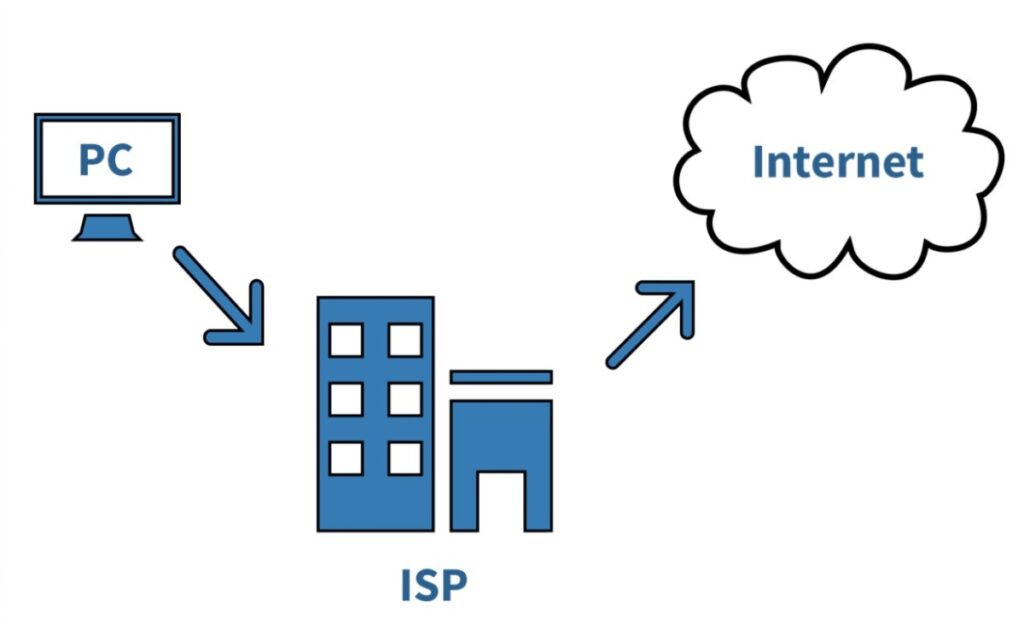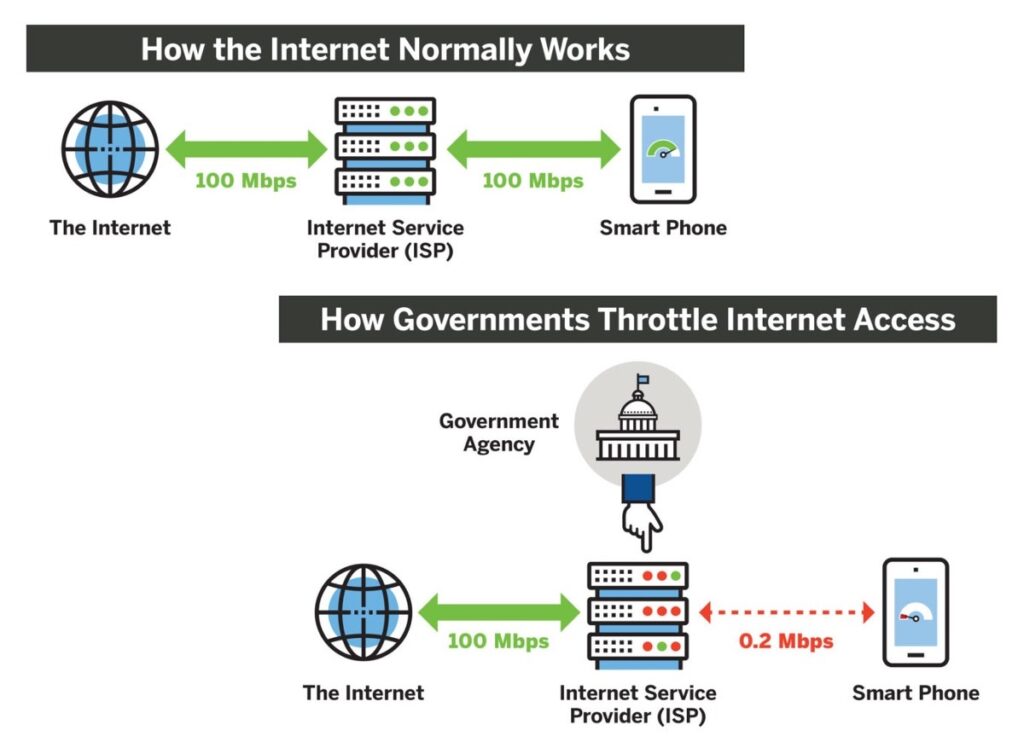An Internet Service Provider (ISP) is a company that provides services allowing you to access the Internet. They play a vital role in today’s society. Unfortunately, this role places ISPs in the perfect position to spy on everything you do online.
Instead of asking if your ISP is spying on you, there are several more pertinent questions to answer instead. For example;
- Will your ISP hand the information to anyone else?
- Is ISP data collection legal in the first place?
- Can just anyone get the data from your ISP?
These questions and their answers play an essential part in your digital privacy. If you aren’t comfortable not knowing, let’s break things down in detail.
How ISPs Work

ISPs connect users to the internet by providing a gateway. When you type in a website address or click on a link, your device sends a request through the ISP’s network, which then routes it to the destination server.
Once the server responds, the ISP facilitates the return journey, delivering the website’s data back to your device. This process, which happens in milliseconds, is facilitated by a complex infrastructure of routers, switches, and data centers owned or leased by the ISP.
What Data Can ISPs See?
We leave behind a trail of electronic breadcrumbs as we navigate the digital realm. When pieced together, these data points can paint a vivid picture of our online habits, preferences, and behaviors.
But just how much of this information is visible to our ISPs? To give you a broad overview, the most pertinent information an ISP gets access to includes;
The Websites You Visit
Whenever you enter a URL or click on a link, your request travels through your ISP before reaching the destination server. This means that ISPs can see the websites you’re visiting.
While they might not see the exact content you’re viewing on encrypted sites (those starting with HTTPS), they can still see the domain names, giving them a general idea of your online activities.
So you should think twice if you’ve the habit of visiting sites like www.sexyhamster.com (no, that’s not a real domain name).
Duration and Time of Your Online Activities
ISPs can monitor the amount of time you spend online and the specific times you access the internet. This data can reveal patterns, such as your peak online hours or the frequency of your internet usage.
Download and Upload Data
Whether you’re streaming a video, downloading a document, or uploading photos, your ISP can see the amount of data you’re transferring. They can identify large file transfers, streaming activities, and even the type of content being downloaded, such as video, audio, or text.
Having your ISP know this data is especially risky for fans of P2P or torrenting. Not all ISPs and countries allow this activity. If they know you’re torrenting, you might find yourself suddenly on the receiving end of a court summons.
Location Data
While ISPs might not have pinpoint accuracy like GPS services, they can determine your approximate location based on your IP address. This is how regional content restrictions, or geoblocking, are enforced.
Further, if your ISP were to somehow “lose” your data, someone else with access might be able to get a general sense of where you stay. Sends chills up your spine, doesn’t it?
Why Would an ISP Monitor Your Data?

The idea of ISPs monitoring our online activities can be unsettling. But why would they want to keep tabs on our digital behavior in the first place? Understanding the motivations behind ISP data monitoring can clarify this contentious issue.
Selling Data to Advertisers
Detailed insights into user behavior can be invaluable for advertisers targeting specific demographics. By analyzing user data, ISPs can create detailed profiles that can be sold to advertisers for targeted marketing campaigns.
This provides an additional revenue stream for ISPs and allows advertisers to tailor their messages to specific audiences. Whether they do so or not depends on where the ISP is based. For example, ISPs in the US can legally sell your data.
Legal and Governmental Requests
ISPs are sometimes legally obligated to monitor and store user data. Law enforcement agencies can request access to this data for investigations, and ISPs must comply. This is particularly relevant in cybercrimes, fraud, or national security concerns.
Again, data retention laws vary by country, so you’ll need to check the specifics to know if your ISP will retail and release your data on request. Most countries will have rather stringent data retention laws.
Network Management and Optimization
Monitoring data isn’t always about profit or surveillance. ISPs need to ensure that their networks run efficiently and smoothly. By analyzing traffic patterns, ISPs can identify potential bottlenecks, optimize bandwidth allocation, and ensure a better user experience.
Implementing Data Caps or Throttling
Some ISPs have data limits for their users, and monitoring data usage is essential to enforce these caps. Users who exceed their data limits might experience throttled speeds or additional charges. Monitoring allows ISPs to implement and manage these restrictions.
While this sounds reasonable and fair, it’s also worth noting that all of this information lies with the ISP alone. It may decide to throttle your traffic because they want you to use less bandwidth.
Does The Law Protect You From ISP Spying?
While ISPs can monitor vast amounts of user data, some legal frameworks are designed to protect consumer privacy. Understanding these laws and regulations can empower users to safeguard their online rights.
Net Neutrality
Net Neutrality is the principle that ISPs should treat all data on the internet the same way, without favoring or blocking particular products or websites. While the specifics of net neutrality laws vary by country, they generally prohibit ISPs from throttling data or prioritizing their content.
This ensures a level playing field online, but its implications for data privacy are still debatable. Again, this is something that sounds pretty but does not regulate ISPs. Don’t count on net neutrality to bind any ISP toward better data protection.
Regional Data Protection Laws
Different regions have implemented data protection laws to safeguard user privacy. For instance, Europe’s General Data Protection Regulation (GDPR) gives users significant control over their data.
Under GDPR, ISPs must be transparent about data collection and usage, and users have the right to access, correct, or delete their data. Similar laws exist in other regions, each with its nuances.
The US also has some data protection laws, primarily state ones. One such example is the California Consumer Privacy Act (CCPA). However, Europe is a rabid dog in data privacy compared to the US.
ISP-specific Privacy Policies
Every ISP has a privacy policy (sometimes known as Terms of Service) outlining how they handle user data. These policies detail what data is collected, its use, and with whom it might be shared.
Ensure you read and understand these policies. They form the contractual basis for data protection between you and the ISP. i.e., if you blindly accept the terms, getting your data sold is indefensible in court.
How to Protect Your Data from ISP Monitoring
 Take Control of Your Online Privacy with NordVPN
Take Control of Your Online Privacy with NordVPN
 Browse the web anonymously and securely.
Browse the web anonymously and securely. Block unwanted ads and malicious websites.
Block unwanted ads and malicious websites. Access geo-restricted content from anywhere in the world.
Access geo-restricted content from anywhere in the world. Enjoy lightning-fast connection speeds with over 5,000 servers in 59 countries.
Enjoy lightning-fast connection speeds with over 5,000 servers in 59 countries.
While legal frameworks provide a certain level of protection, you can take proactive steps to further shield your online activities from ISP monitoring. Here are some effective strategies to enhance your digital privacy:
Use a Virtual Private Network
A Virtual Private Network (VPN) encrypts your internet connection, making it difficult for ISPs to monitor your online activities. When using a VPN, your ISP can only see that you’re connected to a VPN server, not the specific sites you’re visiting or the data you’re transferring.
Secure Browsing With HTTPS
HTTPS ensures that the data exchanged between your browser and the website is encrypted. While ISPs can still see the domain you’re visiting, they cannot decipher the specific content or pages you’re accessing on that site.
Use Encrypted Messaging Apps
Consider using messaging apps that offer end-to-end encryption for private conversations, such as Signal or WhatsApp. This ensures that only the sender and recipient can read the messages, keeping them hidden from ISPs, app providers, and potential eavesdroppers.
Regularly Clearing Cookies and Browsing Data
Cookies can track your online behavior and preferences. Regularly clearing cookies and other browsing data can prevent ISPs and websites from building a detailed profile of your online activities.
Opting Out of Data Collection
Some ISPs offer options for users to opt out of certain data collection practices. While this might not stop all monitoring, it can reduce the data ISPs gather about your online behavior. Again, this is iffy to rely on since most ISPs focus on their rights rather than yours.
Final Thoughts
ISPs inherently possess the capability to monitor our digital footprints. While legitimate reasons exist for some level of monitoring, such as network optimization and legal compliance, the potential for overreach and misuse cannot be ignored.
However, as consumers, we are not passive participants in this digital dance. Armed with knowledge, legal protections, and technological tools, we can exert control over our online privacy.
The ultimate question isn’t just whether our ISPs are spying on us but how we choose to navigate and protect our digital lives.
The post Is My ISP Spying on Me? appeared first on HideMyTraffic.






